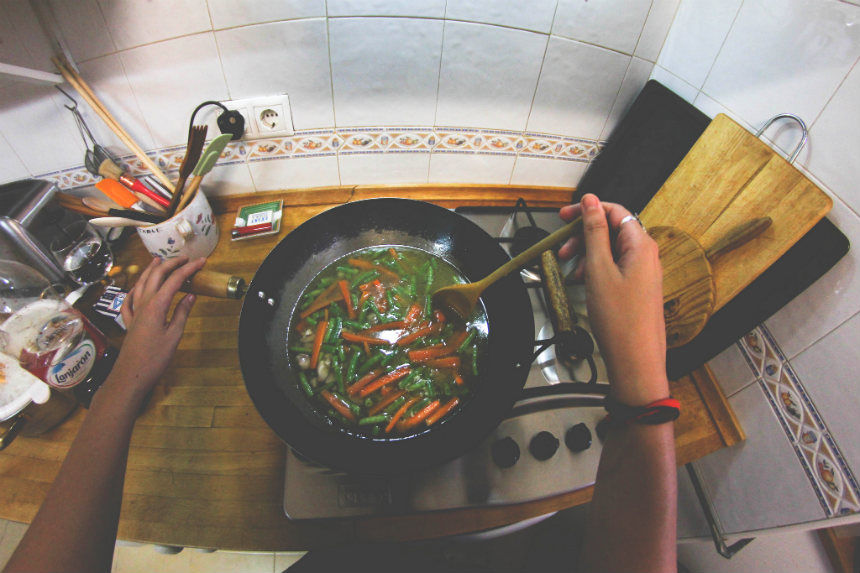Ah, food. The one thing we can all agree that we love.
Yet, so few of us students actually know how to cook. Yes, I’m sure you know how to unfreeze a frozen pizza and make instant noodles, but I’m talking about real cooking. You know, made from scratch. Like mom and dad. But even if you can’t cook, don’t sweat it! Students all across the world are in the same inedible boat as you.
According to the Daily Mail, 1 in 3 university students don’t know how to boil an egg and 48% can’t make a simple Spaghetti Bolognese. And this is the UK where meal plans are not mandatory for freshmen!
Cooking is a skill that you will need for as long as you live. (You kinda got eat). So if you’d like to become even more exceptional than you already are, cooking is a skill worth learning. Why? Well, let me break it down for you.
Why You Should Lean How to Cook

1. You’ll have the advantage of knowing exactly what’s in your food and how it was made. This is especially useful for people with allergies or dietary restrictions. No more undercooked mystery meat for you!
2. You will eat healthier without even trying, because homemade food is fresher than restaurant food and has no additives or preservatives. You also can opt for healthier ingredients that restaurants may not offer.
“Like the time I set the toaster oven on fire or started the blender without the lid on (bet you can guess how that turned out).”
3. You will save money because the price per serving will always be less for home cooked meals than restaurant food. Awesomesauce.
4. It’s convenient. You make food in the perfect serving size for you. You can flavour things according to your taste. You can have a lot more variety in your diet if you can cook. And best of all, you can satisfy all of your cravings whenever you want (3 a.m.? No problem.)
5. You can demonstrate your independence and impress pretty much everyone. (Also good for dating).
6. Above all else, cooking is fun. I’ve had many a kitchen blunders. They become great memories. Like the time I set the toaster oven on fire or started the blender without the lid on (bet you can guess how that turned out).
Simple Five-Step Process to get you Cooking
Step 1: Gear
You’ll need some basic kitchen utensils like pots/pans, skillet, stirring spoons, spatula, baking trays, mixing bowls, knives, a cutting board, grater and a good whisk. You can get other specialized tools later when you start cooking recipes that require them.
Step 2: Kitchen
The second thing you will need is a kitchen. If you live in accommodation that has a kitchen, then as you were. If not, many student residences will have communal kitchens that you can use. You don’t need one of those fancy kitchens they’ve got on cooking shows with a zillion different machines to do everything from making dough to grinding meat. You’re good to go if you’ve got the golden trio that can be found in every kitchen: a stove and oven unit, a sink, and a fridge.
Step 3: Groceries
Food, obviously. This means you will have to go shopping for ingredients. Stock up on the basics: fresh fruits and vegetables, whole grain products, spices, real dairy, and lean meats. Take advantage of sales and compare prices for different brands. It’s okay to stock up on non-perishables like pasta, rice, and flour when they’re on sale, but when it comes to produce, meat, and dairy, it’s best to only buy in quantities you know you will be able to use (mold ain’t a pretty sight).
Step 4: Recipes
Cookbooks are a great resource for recipes, but they cost money. You can get recipes just as great on the Internet. For free! Full Thyme Student, Poor Girl Eats Well, and Budget Bytes are great food sites for students living on a budget. These sites keep in mind that students don’t have a lot of money or time. It’s best to choose recipes that are healthy and can be adapted. Recipes that you can cook now and eat a few days later are good choices too.
Step 5: Cooking Time
Get all your ingredients ready before you cook so you’re not running around trying to do ten things at once while making sure that you’re not starting a fire. This means cutting all vegetables, preparing meat, shredding cheese etc. before you turn on any heat source. Then, when you’re prepped, you can whip up something great and let the delicious times begin!
And there you have it. It’s as simple as that. Know that it’s never too late (or too early) to learn how to cook! Stay tuned for the next article in which I’ll be sharing some of my favourite recipes that are quick, healthy, and great for beginner cooks!
Like food? Us too. In the next food post, we’ll give you student-tested recipes. Got a recipe or cooking tip, fire away in the comments!
Photos courtesy: cooking fire (P. Klashorst) cooking beans (Leo Hidalgo)
*Opinions expressed are those of the author, and not necessarily those of Student Life Network or their partners.




